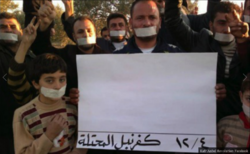Syria Opinion: How to Meet the Challenge of Covering Conflict
 James Miller, Joanna Paraszczuk, and Scott Lucas write:
James Miller, Joanna Paraszczuk, and Scott Lucas write:
There has been a curious and telling juxtaposition of events and coverage in and about Syria this month. On the one hand, a series of important stories --- some of them "real", some of them spin --- raised the political and military stakes both for Syrians and for others in the region :
- The Syrian regime and the insurgents traded advances and takeovers of key positions.
- The US, Britain, and Israel claimed there was evidence that the Assad regime used chemical weapons.
- There was another suspected chemical weapons attack in Saraqib in Idlib Province.
- More than 100 people were slain, allegedly by regime forces, in the coastal town of al-Bayada, as talk escalated of "ethnic cleansing".
- Israel bombed several Syrian military facilities and weapons shipments to Hezbollah, which proclaimed its involvement in the conflict.
- Four UN peacekeepers were kidnapped in the Golan Heights.
Dramatic and complex events like these, and the prospect that the conflict will escalate yet further both in and beyond Syria, demands careful, dedicated and in-depth coverage and analysis. Yet, on Wednesday, The Guardian announced that after 28 months, it is ending its Live Coverage not just of Syria, but of the entire Middle East. Its reason --- belied by events --- is that news is slowing to "gradual incremental developments" and The Guardian can no longer justify expenditure of resources on the project.
The Guardian's Live Coverage, which began in the early days of the Tunisian and Egyptian uprisings, has also provided important reporting on the revolution in Libya. The Guardian was one of the few outlets reporting regularly on Yemen in 2011-12 as the Saleh regime was pushed aside. Even as other news services reduced coverage of the Middle East, leaving the overwhelming bulk of reporting to just two wire agencies, Reuters and AP, The Guardian continued to cover Syria "on the ground".
Why has that mattered?
The Live Coverage format is distinctive from more traditional forms of reporting, while complementing that journalism. Beyond immediacy, Live Coverage acts as an open-source laboratory, in which information is collected, crowd-sourced, sorted, debated and discussed. Even brief updates --- including from social media and other local sources --- open up possibilities and allow journalists and the wider public to add details and context as events unfold.
This format allows the scope of basic wire stories to be expanded with reactions and observations from activists, analysts, and field reporters and interviews with witnesses.
In an ongoing, complex and confusing conflict such as that in Syria, where events move so quickly, the concept of the traditional "news cycle" breaks down. Daily reports of press conferences, a particular clash, or a specific, deadly airstrike prove woefully insufficient when it comes to understanding events on the ground. Instead, "news" should making sense out of chaos from a multitude of voices as events rapidly unfold and scenes shift.
"News" is an ongoing process in which events usually pose more questions rather than offering more answers. Important stories are complicated, with fuzzy details, murky sources, and unclear consquences.
That runs counter, however, to the desire for quick and easy answers. So rather than building from the "ground up" to offer detailed analysis, headlines impose superficial and often misleading narratives.
The Insurgents are on the Point of Victory. The Regime is on the Point of Defeating the Insurgency. Al Qa'eda, via Islamist Forces, is Taking Over the Fight Against Assad. Chemical Weapons Have Definitely Been Used. It is Now a Sectarian War.
Some of these narratives may contain a part of the "truth". However, it is a "truth" that --- without day-to-day rigorous coverage --- can be little more than assumption.
At a time when the political and military situation inside and around Syria is more complex than at any point in the 26-month conflict, those assumptions are ineffective palliatives. And they become excuses to walk away from the difficult task of reporting. As The Guardian's Paul Owen explained further about the decision to shut down Live Coverage: "If more significant developments begin to take place, whether in the rebels' or the government's favour, we will bring the full live blog back to cover them."
But that is not how Live Coverage --- and the critical analysis and understanding of developments --- work. You cannot just "dip into" a story every few days. Analysts and reporters must track events constantly, collecting details, covering nuance, and cutting through the soundbite and press release.
Despite its explanation of "incremental" news developments in Syria, The Guardian's decision to end its Live Coverage was likely underpinned by commercial, and not journalistic, considerations. However, if news is to be effective, media have to find a way out from the financial dead end.
 Chemical Weapons,
Chemical Weapons,  Israel,
Israel,  Paul Owen,
Paul Owen,  Syria,
Syria,  The Guardian
The Guardian 
Reader Comments